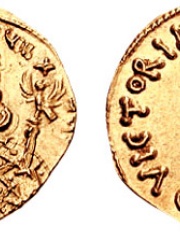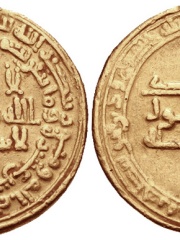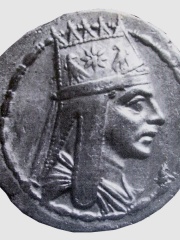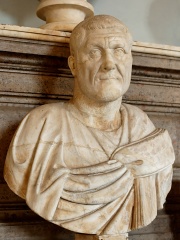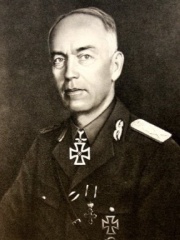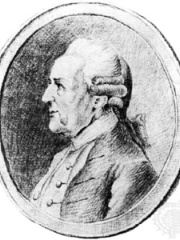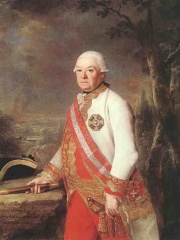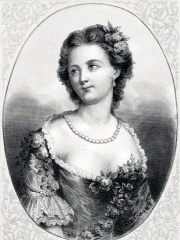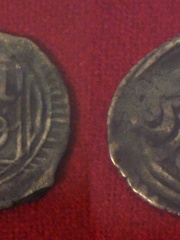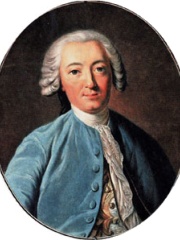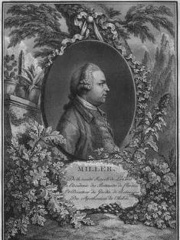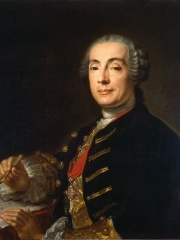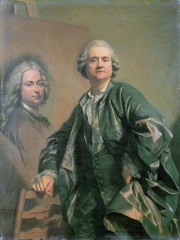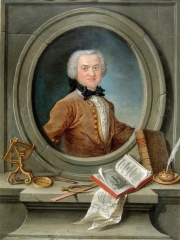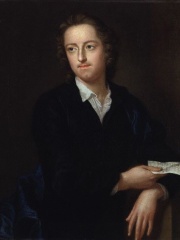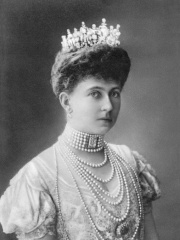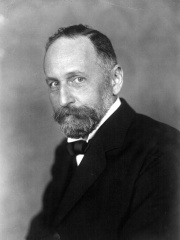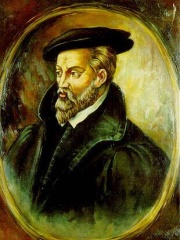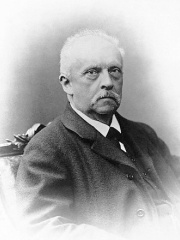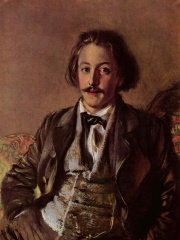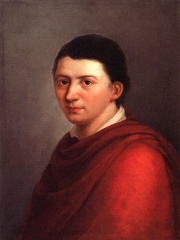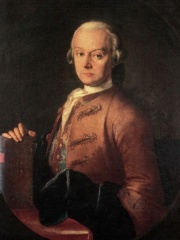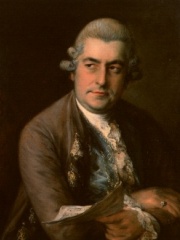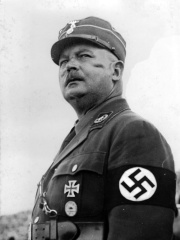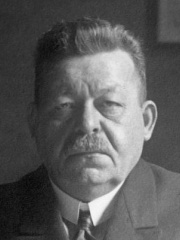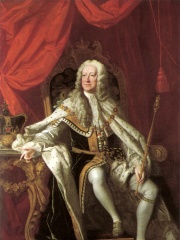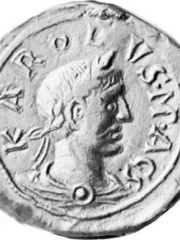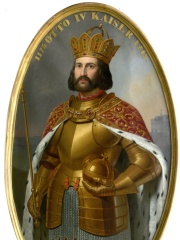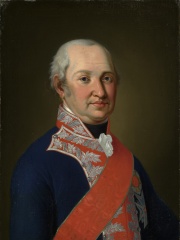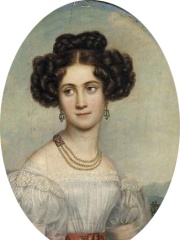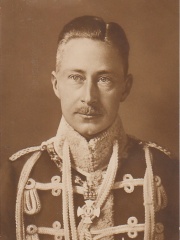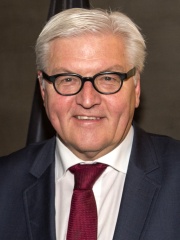POLITICIAN
Adolf Frederick, King of Sweden
1710 - 1771
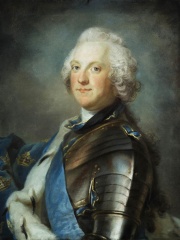
 Adolf Frederick, King of Sweden
Adolf Frederick, King of Sweden
Adolf (or Adolph) Frederick (Swedish: Adolf Fredrik; German: Adolf Friedrich; 14 May 1710 – 12 February 1771) was King of Sweden from 1751 until his death in 1771. He was the son of Christian August of Holstein-Gottorp, Prince of Eutin, and Albertina Frederica of Baden-Durlach. He was an uncle of Catherine the Great and husband to Louisa Ulrika of Prussia. After 220 years the House of Oldenburg returned to the Swedish throne with Adolf Frederick through its Holstein-Gottorp branch. Read more on Wikipedia
His biography is available in 48 different languages on Wikipedia. Adolf Frederick, King of Sweden is the 737th most popular politician (up from 850th in 2024), the 191st most popular biography from Germany (up from 236th in 2019) and the 55th most popular German Politician.
Adolf Frederick, King of Sweden, is most famous for being the last Swedish monarch to reign over both Sweden and Norway. He was the son of Gustav III of Sweden and Sophia Magdalena of Denmark.
Memorability Metrics
Page views of Adolf Frederick, King of Sweden by language
Among POLITICIANS
Among politicians, Adolf Frederick, King of Sweden ranks 737 out of 19,576. Before him are Christian II of Denmark, Philippikos Bardanes, Richard von Coudenhove-Kalergi, Nebuchadnezzar I, Al-Ma'mun, and Ptolemy XIII Theos Philopator. After him are Tigranes the Great, Maximinus Thrax, Yesugei, Ptolemy III Euergetes, Taejong of Joseon, and Ion Antonescu.
Most Popular Politicians in Wikipedia
Go to all RankingsChristian II of Denmark
1481 - 1559
HPI: 77.34
Rank: 731
Philippikos Bardanes
700 - 713
HPI: 77.33
Rank: 732
Richard von Coudenhove-Kalergi
1894 - 1972
HPI: 77.33
Rank: 733
Nebuchadnezzar I
1200 BC - 1104 BC
HPI: 77.32
Rank: 734
Al-Ma'mun
786 - 833
HPI: 77.32
Rank: 735
Ptolemy XIII Theos Philopator
62 BC - 47 BC
HPI: 77.30
Rank: 736
Adolf Frederick, King of Sweden
1710 - 1771
HPI: 77.29
Rank: 737
Tigranes the Great
140 BC - 55 BC
HPI: 77.29
Rank: 738
Maximinus Thrax
173 - 238
HPI: 77.29
Rank: 739
Yesugei
1134 - 1171
HPI: 77.28
Rank: 740
Ptolemy III Euergetes
284 BC - 222 BC
HPI: 77.28
Rank: 741
Taejong of Joseon
1367 - 1422
HPI: 77.28
Rank: 742
Ion Antonescu
1882 - 1946
HPI: 77.28
Rank: 743
Contemporaries
Among people born in 1710, Adolf Frederick, King of Sweden ranks 3. Before him are Louis XV of France, and Giovanni Battista Pergolesi. After him are Thomas Reid, Wilhelm Friedemann Bach, Muhammad bin Saud, András Hadik, Domenico Alberti, Marie-Anne de Cupis de Camargo, Mohammed ben Abdallah, Thomas Arne, and Carl Alexander Clerck. Among people deceased in 1771, Adolf Frederick, King of Sweden ranks 1. After him are Claude Adrien Helvétius, Philip Miller, Francesco Bartolomeo Rastrelli, Louis-Michel van Loo, Giovanni Battista Morgagni, Henri Pitot, John Bevis, Jean-Baptiste de Boyer, Marquis d'Argens, František Brixi, Thomas Gray, and Tobias Smollett.
Others Born in 1710
Go to all RankingsLouis XV of France
POLITICIAN
1710 - 1774
HPI: 86.93
Rank: 1
Giovanni Battista Pergolesi
COMPOSER
1710 - 1736
HPI: 78.19
Rank: 2
Adolf Frederick, King of Sweden
POLITICIAN
1710 - 1771
HPI: 77.29
Rank: 3
Thomas Reid
PHILOSOPHER
1710 - 1796
HPI: 75.18
Rank: 4
Wilhelm Friedemann Bach
COMPOSER
1710 - 1784
HPI: 71.37
Rank: 5
Muhammad bin Saud
POLITICIAN
1710 - 1765
HPI: 70.45
Rank: 6
András Hadik
POLITICIAN
1710 - 1790
HPI: 66.42
Rank: 7
Domenico Alberti
MUSICIAN
1710 - 1746
HPI: 65.15
Rank: 8
Marie-Anne de Cupis de Camargo
DANCER
1710 - 1770
HPI: 65.03
Rank: 9
Mohammed ben Abdallah
POLITICIAN
1710 - 1790
HPI: 64.21
Rank: 10
Thomas Arne
COMPOSER
1710 - 1778
HPI: 63.99
Rank: 11
Carl Alexander Clerck
BIOLOGIST
1710 - 1765
HPI: 63.01
Rank: 12
Others Deceased in 1771
Go to all RankingsAdolf Frederick, King of Sweden
POLITICIAN
1710 - 1771
HPI: 77.29
Rank: 1
Claude Adrien Helvétius
PHILOSOPHER
1715 - 1771
HPI: 74.83
Rank: 2
Philip Miller
BIOLOGIST
1691 - 1771
HPI: 70.32
Rank: 3
Francesco Bartolomeo Rastrelli
ARCHITECT
1700 - 1771
HPI: 69.21
Rank: 4
Louis-Michel van Loo
PAINTER
1707 - 1771
HPI: 66.54
Rank: 5
Giovanni Battista Morgagni
PHYSICIAN
1682 - 1771
HPI: 65.75
Rank: 6
Henri Pitot
PHYSICIST
1695 - 1771
HPI: 64.88
Rank: 7
John Bevis
ASTRONOMER
1695 - 1771
HPI: 63.12
Rank: 8
Jean-Baptiste de Boyer, Marquis d'Argens
WRITER
1704 - 1771
HPI: 62.75
Rank: 9
František Brixi
COMPOSER
1732 - 1771
HPI: 62.45
Rank: 10
Thomas Gray
WRITER
1716 - 1771
HPI: 62.39
Rank: 11
Tobias Smollett
WRITER
1721 - 1771
HPI: 62.35
Rank: 12
In Germany
Among people born in Germany, Adolf Frederick, King of Sweden ranks 191 out of 7,253. Before him are Nelly Sachs (1891), Sophia of Prussia (1870), Richard Willstätter (1872), Georgius Agricola (1494), Hermann von Helmholtz (1821), and Paul Heyse (1830). After him are Hans-Georg Gadamer (1900), Friedrich Schlegel (1772), Leopold Mozart (1719), Johann Christian Bach (1735), Ernst Röhm (1887), and Friedrich Ebert (1871).
Others born in Germany
Go to all RankingsNelly Sachs
WRITER
1891 - 1970
HPI: 77.39
Rank: 185
Sophia of Prussia
SOCIAL ACTIVIST
1870 - 1932
HPI: 77.39
Rank: 186
Richard Willstätter
CHEMIST
1872 - 1942
HPI: 77.35
Rank: 187
Georgius Agricola
PHYSICIAN
1494 - 1555
HPI: 77.34
Rank: 188
Hermann von Helmholtz
PHYSICIST
1821 - 1894
HPI: 77.32
Rank: 189
Paul Heyse
WRITER
1830 - 1914
HPI: 77.29
Rank: 190
Adolf Frederick, King of Sweden
POLITICIAN
1710 - 1771
HPI: 77.29
Rank: 191
Hans-Georg Gadamer
PHILOSOPHER
1900 - 2002
HPI: 77.23
Rank: 192
Friedrich Schlegel
WRITER
1772 - 1829
HPI: 77.16
Rank: 193
Leopold Mozart
MUSICIAN
1719 - 1787
HPI: 77.16
Rank: 194
Johann Christian Bach
COMPOSER
1735 - 1782
HPI: 77.07
Rank: 195
Ernst Röhm
MILITARY PERSONNEL
1887 - 1934
HPI: 77.03
Rank: 196
Friedrich Ebert
POLITICIAN
1871 - 1925
HPI: 77.02
Rank: 197
Among POLITICIANS In Germany
Among politicians born in Germany, Adolf Frederick, King of Sweden ranks 55. Before him are Olaf Scholz (1958), George II of Great Britain (1683), Frederick William I of Prussia (1688), Charles the Fat (839), Otto IV, Holy Roman Emperor (1175), and Conrad III of Germany (1093). After him are Friedrich Ebert (1871), Conrad II, Holy Roman Emperor (990), Maximilian I Joseph of Bavaria (1756), Princess Ludovika of Bavaria (1808), Wilhelm, German Crown Prince (1882), and Frank-Walter Steinmeier (1956).
Olaf Scholz
1958 - Present
HPI: 77.93
Rank: 49
George II of Great Britain
1683 - 1760
HPI: 77.79
Rank: 50
Frederick William I of Prussia
1688 - 1740
HPI: 77.54
Rank: 51
Charles the Fat
839 - 888
HPI: 77.50
Rank: 52
Otto IV, Holy Roman Emperor
1175 - 1218
HPI: 77.49
Rank: 53
Conrad III of Germany
1093 - 1152
HPI: 77.44
Rank: 54
Adolf Frederick, King of Sweden
1710 - 1771
HPI: 77.29
Rank: 55
Friedrich Ebert
1871 - 1925
HPI: 77.02
Rank: 56
Conrad II, Holy Roman Emperor
990 - 1039
HPI: 76.98
Rank: 57
Maximilian I Joseph of Bavaria
1756 - 1825
HPI: 76.82
Rank: 58
Princess Ludovika of Bavaria
1808 - 1892
HPI: 76.79
Rank: 59
Wilhelm, German Crown Prince
1882 - 1951
HPI: 76.73
Rank: 60
Frank-Walter Steinmeier
1956 - Present
HPI: 76.70
Rank: 61

